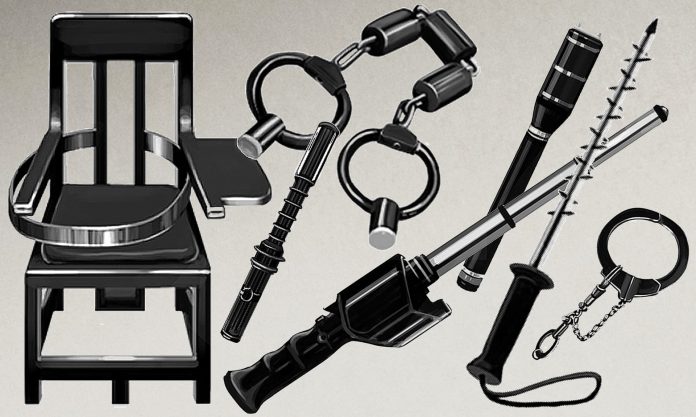(THIS ARTICLE IS MACHINE TRANSLATED by Google from Norwegian)
There is no situation there torture is acceptable or appropriate. Any practice that destroys the victim's body and soul to control his or her will is an abuse of human dignity. Studies show that torture is a very effective method that, in addition to the catastrophic consequences it can have for the victim, can provide the torturer with false information, contrary to its intent.
Although torture is strictly prohibited by international law, it is still widespread. FN has its own day of support for torture victims, June 26 ,. The best way to support and honor victims is to take steps to stop, or at least prevent, this practice globally. A good place to start is through international trade.
Turn freely
Although many countries have pledged to abolish the death penalty and inhumane treatment, torture tools can still be traded freely across national borders. It is easy to get hold of finger screws, thumb cuffs, batons with spikes and whips with spikes or hooks. Such objects have no uses other than inflicting suffering and pain on people, yet they cross free boundaries like any other commodity.
This is not the case everywhere. Since 2005, EU regulated trade in certain types of equipment and goods, such as hangers, electric chairs, and lethal injection systems that can be used for the death penalty, torture, or other inhumane treatment. Such objects can never cross the EU's borders, even for transit.
Such restrictions have made it more difficult to acquire tools for inhumane activities. Nevertheless, manufacturers and sellers can bypass the restrictions, for example by redirecting goods shipments. Although this practice results in higher prices, the restrictions are far from adequate as a deterrent.
Experience shows that what works is to ban the sale of torture tools. But it also shows that the ban must be implemented globally in order to have maximum effect. As long as few countries restrict such trade, it will always be possible to avoid countries that restrict it.
Alliance
This is why the EU, Argentina og Mongolia launched Alliance for Torture-Free Trade in September 2017, aimed at ending the trade in goods whose sole purpose is to cause people pain. Today, the alliance has 65 member countries, with all inhabited continents represented. [In addition, 166 nations have ratified the UN Torture Convention, which prohibits torture, ed.]
During its first meeting last September, the alliance decided to turn political commitments into action. In a joint statement, members agreed to work to create a UN-based instrument, such as a binding convention, to halt the trafficking of torture tools.
One year later, we are at the first milestone in this work. It is now expected that the UN General Assembly will adopt a resolution aimed at trafficking in tools, with the aim of stopping production of such equipment. The resolution will be an effective start in the process of establishing international rules for such activities, bringing us one step closer to a world without torture.
International obligations
Going from resolution to binding international agreements will not be easy. But international conventions such as the Arms Trade Treaty [which controls international trade in conventional weapons, ed.] And the CITES (Convention on International Trade in Endangered Species of Wild Fauna and Flora) regulations show that through a broad international commitment, trade can be made more responsible and humane. Achieving a similar success in dealing with torture tools will require government support from around the world.
The EU, which has been at the forefront of this process from the outset, is committed to maintaining its leadership role and will continue to work with other countries to ensure a binding regulatory framework for trade in torture devices. This is a key point in our value-based trade agenda.
Of course, rules that prevent trade will not end the torture practice itself. But the rules will make it much more difficult – and more expensive – for the torturers, while the producers' profits are squeezed so much that they are encouraged to look for other earning opportunities. It would have been a big win. For the sake of those who have endured, and continue to endure, torture, governments around the world should come together to achieve this.
Translated by Iril Kolle


